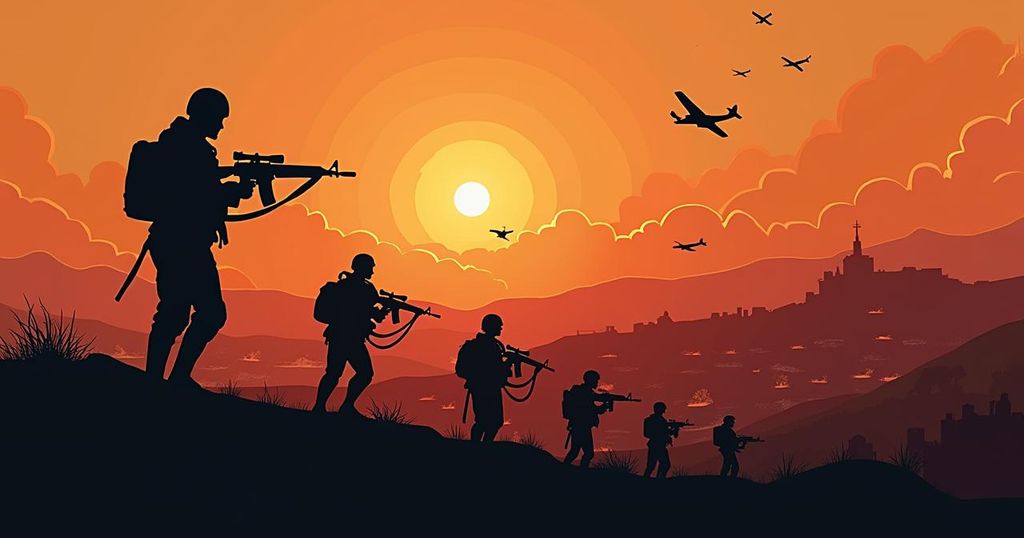Escalating Conflict in Lebanon: IDF and Hezbollah Exchange Fire Amidst U.N. Condemnation
Intense clashes are occurring between Israeli forces and Hezbollah in Lebanon, with the IDF reporting the death of over 50 operatives. U.N. spokesperson Jeremy Laurence criticized these actions as reminiscent of those in Gaza, emphasizing the severe humanitarian impact. The Israel-Gaza conflict continues to exert regional pressures, further complicating the already fragile dynamics between Israel, Hezbollah, and international observers.
The situation in Lebanon remains dire with intense fighting between Israeli forces and Hezbollah militants. The Israeli Defense Forces (IDF) have confirmed that they have eliminated over 50 Hezbollah operatives in their recent operations in southern Lebanon. This escalation comes amidst a broader context of ongoing hostilities in the region tied to the Israel-Gaza conflict, which has persisted for more than a year. Jeremy Laurence, a spokesperson for the United Nations Human Rights Office, has voiced strong opposition to the IDF’s military strategies, labeling them as employing tactics similar to those utilized in Gaza, where destruction has reached catastrophic levels. Laurence described the situation in both conflict zones as being of such magnitude that it is alarming to behold. The Israel-Gaza war ignited on October 7, when Hamas launched an extensive cross-border invasion, resulting in the deaths of approximately 1,200 individuals and taking numerous civilians as hostages. The Israeli government responded decisively, declaring war against Hamas, which led to a substantial ground invasion that has, so far, displaced more individuals than any conflict since the establishment of Israel in 1948. Additionally, Hezbollah, which receives substantial support from Iran, has seen conflicts with Israel intensify throughout this year. This led to an Israeli incursion into southern Lebanon, marked by a significant uptick in airstrikes that have claimed over 1,400 lives, including that of Hasan Nasrallah, the long-standing head of Hezbollah. The Israel-Lebanon border remains fraught with violence, echoing historical tensions that stretch back many decades. In the adjacent Gaza Strip, the humanitarian crisis continues to worsen. Israeli military operations there have resulted in tens of thousands of fatalities, causing severe food shortages affecting half of Gaza’s population. Despite growing international calls for greater humanitarian engagement, Israel appears to be reluctant to amend its restrictive policies. The role of the United States in this ongoing conflict is also noteworthy. Despite increasing tensions between Israeli Prime Minister Benjamin Netanyahu and key U.S. leaders, including President Joe Biden, the United States has sustained its support for Israel through military provisions and financial packages while often countering calls for a ceasefire at the United Nations.
The ongoing conflict between Israel and groups such as Hezbollah and Hamas has roots that delve deep into historical grievances and disputes over territory, identity, and statehood. Following the establishment of the state of Israel in 1948, a series of wars and confrontations marked the Middle East. The situation has escalated significantly with the resurgence of hostilities, particularly following notable events such as the 2023 Hamas-led incursion into Israel and subsequent military strategies employed by Israel against militant organizations in the region. The rising death toll and humanitarian crises, particularly in Gaza, have prompted international dialogue about the conflict and its implications for regional stability.
In conclusion, the renewed violence between Israeli forces and Hezbollah represents a critical juncture in Middle Eastern geopolitical relations. As both sides engage in fierce confrontation, international voices grow louder condemning the humanitarian implications of these conflicts. The grim realities on the ground in both Lebanon and Gaza emphasize the urgent need for dialogue and ceasefire to mitigate further loss of life and suffering.
Original Source: www.washingtonpost.com




Post Comment